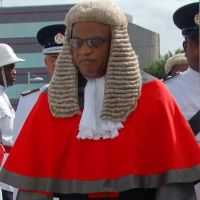Judges can police themselves, says CJ
(CNS): Cayman’s top judge has warned that too much external regulation and discipline of judges will undermine the importance of judicial independence, as he urged a gathering of legal heavyweights to be cautious of ascribing disciplinary powers to judicial service commissions. Chief Justice Anthony Smellie raised concerns that the trend towards accountability for all public servants and calls for wider public participation could be perceived as a kind of “petty tyranny” that could be a harmful intrusion in to the work judges do.
Speaking at the opening of a commonwealth conference being hosted in Cayman to discuss the operation of judicial services commissions and possible Commonwealth-wide model law to set out good practice in this area, Smellie warned that while the commissions provide an open, accountable and fair process for judicial appointments, he had strong concern about their role as disciplinary regulators.
In his address to the audience of judges, lawyers and other legal professionals from around the Commonwealth, he said that apart from the ultimate sanction of removal, judges have been responsible for disciplining themselves and the system has worked well. Judges, he said, have shown they can be relied upon and extra-judicial intervention has been rare.
But with increased public expectation on transparency and accountability, the chief justice warned that “notions of what is in the public interest can all too readily be transformed into a subtle and insidious if petty kind of tyranny”, as he pointed to what he described as a clamour for instant appeasement by the public.
“The universally accessible blogosphere and social media have become not only the platforms of the justified but also the bully pulpits of the disgruntled and misinformed,” he said, as he made it clear that he disagreed with the idea that greater public participation in the discipline of the judiciary was in the public interest.
“Such a notion can all too readily be confused with regulation and control and it will be an unusual judge indeed who can carry on with his duties undaunted, while knowing that a complaint has been made against him, however spuriously, to an external regulatory body,” he said. “This risk of harmful intrusion upon the judicial role is inimical to judicial independence both at the institutional and individual levels.”
Smellie said judicial intrusion was not needed as judges’ work was already transparent.
“Judges and magistrates carry out their demanding and difficult duties in open court, in the full glare of public scrutiny. Typically, this is under the watchful eyes of the press on the behalf of members of the public,” the chief justice stated. “Where there may be cause for complaint about decisions, these are typically amenable to being corrected by way of appeal, a process itself that also takes place in the same open and transparent system.”
He said that as the conference discussions got underway this week, participants needed to be mindful about the dangers of over-intrusion upon independence when considering the disciplinary powers of judicial service commissions and any common standard that is adopted.
Defending judicial independence, the CJ said he was not proposing that judges should be left to “dwell in Ivory Towers” and pointed to the perception of aloofness regarding judges which has led to a general “lack of public sympathy for the plight of judges, whether that be related to their unfavourable treatment or to the difficult circumstances and challenges they must confront”.
Despite serious concerns, such as a lack of institutional fiscal autonomy, the judiciary cannot be its own advocate and given the lack of public warmth for the bench in general, he said it was an area the profession also had to consider and examine, whether the composition and responsibilities of judicial commission could extend to the protection of the judiciary as much as its regulator.
“An objective should be to dispel any lingering concerns about judicial aloofness, to sensitize the public to a better understanding of what it is judges do in their name, and why it is so important that the judiciary is properly supported to carry out its responsibilities,” he said. “This would be a role for a more outspoken and representative JSC, a body that is seen not only as acting in a quasi-regulatory capacity, but also as a supporter of the judiciary, as an advocate for fiscal autonomy and for reasonable terms and conditions of service.”
The goal of the three day conference is to work on a draft model law created by the Commonwealth Secretariat that member states could adopt for judicial appointments and disciplinary processes.
“Strengthening judicial service commissions is fundamental to ensuring an independent judiciary – a cornerstone of democracy. Creating this model law is an important step towards establishing good practice in judicial appointments and discipline. It provides for fair, independent and transparent procedures,” said Mark Guthrie, Rule of Law Legal Adviser at the Commonwealth Secretariat, who is also at the conference.





































Sorry, don’t buy this argument at all. I’ve seen too many instances where the most respectable and highly regarded people fall from grace after being caught red handed. These people no matter what position in society they hold should not have god status.
Everyone should have the right to be judged by their peers. Is this not what the CJ is suggesting, rather than have “external regulation” as he put it?
I didn’t read it quite that way… I thought they wanted to regulate themselves and the CJ would be regulated by…well, himself! Am I wrong?
To 3:14 pm at 16/12: the CJ and the judges are regulated, as you put it, by the law and well established standards to which judges should aspire and are evaluated. When they depart from law or ethical standards, there are procedures in place to conduct hearings into their behaviour and, if the allegations are proven, remove them from office.
If judges do not have the strength of character to conduct themselves in keeping with the highest standards of ethics and morals, they should be removed from office post haste. If they need a public spanking from the JLSC, then they are to fit to sit on judgement over the rest of us fallible mortals.
This is not to say that there may not be minor missteps — they are human. But anything that rises to the level to warrant going before the JLSC — presumably after internal efforts have failed — should mean one thing — dismissal.
The problem is that the UK POLICE apparatus have been doing here for so long and getting away with it that judiciary are now seeking to do it also with all the same rights and privileges, immunities! You right the goose now wants what the gander has been getting too.
The medical profession in the UK believed they could police themselves but that view was severely dented by Dr Harold Shipman who murdered over 100 mostly old ladies.
To anonymous at 4:25 pm on 15/12: doctors still do world over regulate themselves. Hospitals do have their built in systems of disciplining within health care delivery systems, but criminal acts are still subject to the law — same as for judges.
So your example of Dr Shipman was a weak one. Dr. Shipman was a psychopathic serial killer who was not deterred from his villaneous acts by the threat of the highest sanctions possible under the law of the land — to which everyone is subject — in all walks of life, under any circumstances.
You’ve got to be the same person that was concerned about scandalising the judiciary. How is it so objectionable to have an oversight body and transparency. how is it sensible to file a complaint to the same body that you’re complaining against with the hope that they will police themselves.
No 9:44, he’s not the same person who posted about scandalising the judiciary -that was me and I wanted people to have a smile about it because I think it is one of these stupid things that has survived in some places in the ex colonial world and not others and, I suspect, not in Britain. Like that other brilliant one: insulting the modesty of a woman (but not a man). The ridiculous thing is you can actually be prosecuted for both these “offences”.
Scary to think that a judge in the 21st Century would advocate that judges can police themselves. The judiciary should be held to the highest form of scrutiny. A system of chacks and balances is absolutely paramount.
There is a disciplinary system for judges — we saw it at work in the case of former judge Prya Levers. When a judge’s behaviour rises to the point that he or she does not respond to reproof by the internal channels, or when behaviour is beyond ordinary internal reproof, then action is brought to remove that judge from office, again, as was done in the case of the judge referred to. And that was done in the full glare of public scrutiny. If the judge is innocent, he or she will be seen to be so.
When we entrust judges to sit in judgment of others, they themselves must be above reproach — and if they require disciplining, they should do in the full public glare and if it is determined that it is warranted, they should go. That is all the CJ is actually saying.
That’s actually not all that the CJ is saying. I also seem to recall that it took a great deal of hardship to others before this process of removing Levers occurred and the CJ himself had to be a party to starting the process. So I’m not sure you or the CJ make a valid point. Who oversees the judiciary including the CJ?
4:15 am, at 16/12: yes, the CJ himself did initiate the process. We can depend on this and other Chief Justices to rise to the challenge of bringing disciplinary action when necessary. Case closed.
Agreed. If they really want more transparency they need to put cameras in the courtroom and that includes both Summary and Grand Courts. This is essential.
“In his defence, M’Lud, the red suited man with the white hair and big sack was actually going down the chimney to deliver presents, not to steal”
No one can police themselves. Could Canover Watson? Could McKeeva Bush? Could Sue Nicholson? Could Jeffrey Webb? Could Edlin Myles? I could go on, and on and on and on and on…….
Megaphone, give it a rest will ya? You keep going on and on and on! Jeez I got a wife for that!
And is who’s pleasing your wife, sorry, mean’t policing?
The other issue that needs to be addressed, is that the justice you get, is based on what you can afford.
How would we know if the current disciplinary system is working well when there is no current disciplinary system.
This is so ironic. The judge who writes about transparency of government bodies and boards (rightfully so) doesn’t want the same sort of accountability for himself or his department. This is a clear indication that he firmly believes he at least is now above the law. Tara Bushes judgement by the CJ is proof that perhaps he’s been in that post far too long. For Cayman to move forward it needs a new AG, CJ and head of CIMA. These persons have all served their time but have been in their posts for far too long to maintain a healthy perspective. It cannot be that just because they hold Cayman status they are automatically in place until retirement age. None of these persons have any accountability as it is and efforts to remove any independent and meaningful oversight is or should be of great concern.
The CJ has a valid point. At the end of the day, somebody has to have the last say. It has always been the Courts. Are you suggesting the Governor or FCO should trump Judges??? The CJ is not in the post too long for no reason. His experience is an asset.
not at all. But there is no reason why a senior panel of competent retired judges etc couldn’t become an oversight committee for instance. In fact who oversees the AG at the moment? No one! That isn’t good either. There is the very real need for oversight. This latest move away from transparency and oversight makes us all uncomfortable and must be discouraged. I am sure the AG, Ms Scotland and the CJ have all learned much along the way but to say they shouldn’t retire or move on to other jurisdictions to hold similar posts because they have invaluable experience (or because they are Caymanian), is short-sighted. In any event, I wish them all the best for so long as they remain in their posts.
The last say should be the people. Judges are not kings and must be subject to removal for cause through some mechanism besides other judges on the same bench.
To12:11at16/12: you are right, judges should have some mechanism to be removed — and they do. There are a whole cohort of judges and magistrates and another bevy of professionals and a host of personnel at the courts who are all fine examples of persons of integrity and character. If anyone in the lot begins to go off the rails, they will know and can be relied upon to take appropriate action. And this is Cayman, the public will know. And remember that everything that judges do is open to full scrutiny by the public who are in court every day,along with lawyers and police officers. That is what happened in the case of Prya Levers — her colleagues, the court staff, and the public observed her behaviour and what she said in open court, and all sort of bells started to go off. So I don’t think we have to worry so much about judges misbehaving below the radar of detection.
And if judges do misbehave, there is a well established process of getting rid of them. We saw that at work with Prya Levers. True, it is a painful process, as someone observed, and that in itself speaks volumes for the strength and character of our judiciary.
That case was clearly a departure from the norm and we saw how that was dealt with — in public view — and when you get there there are only two ways to go — complete exoneration or relieving from duties.
i am much happier with that either or Than a slap via the JLSC. If they ain’t got the necessary character to behave professionally and with integrity, I am not going to trust them to be a judge over me.
Oh good, 8:48. Thanks. So we don’t need to have any worries. The judges know when they are acting wrongly. Thanks for making us realise all is well. I was so worried that, like 100% of other human beings, they might need some oversight. You have made me feel better now.
Lord Denning.
Be careful you are not accused of “scandalising the judiciary” 7:51.
The judge started it. His comments off the bench are fair game.
So what’s good for the goose is NOT good for the gander.